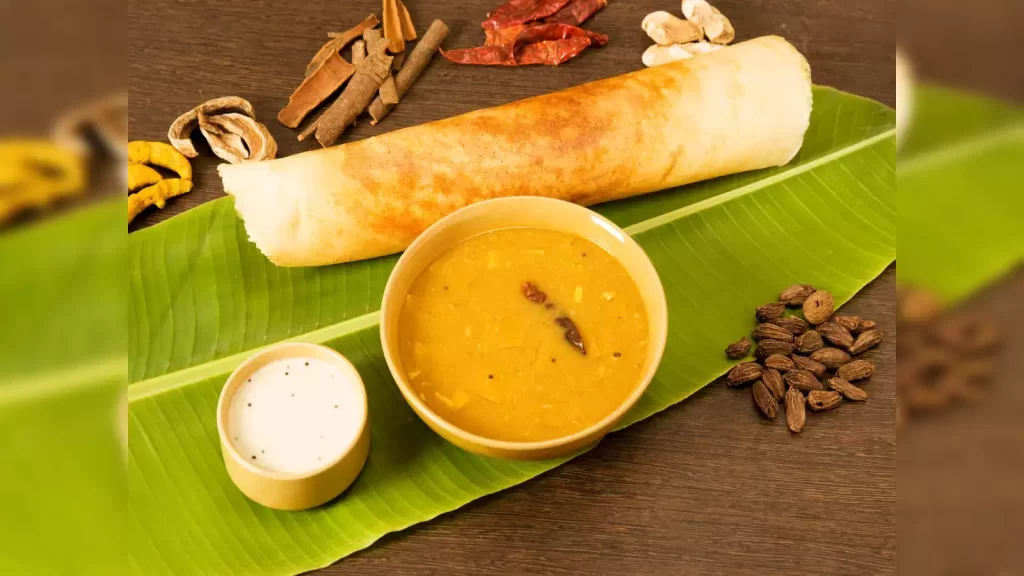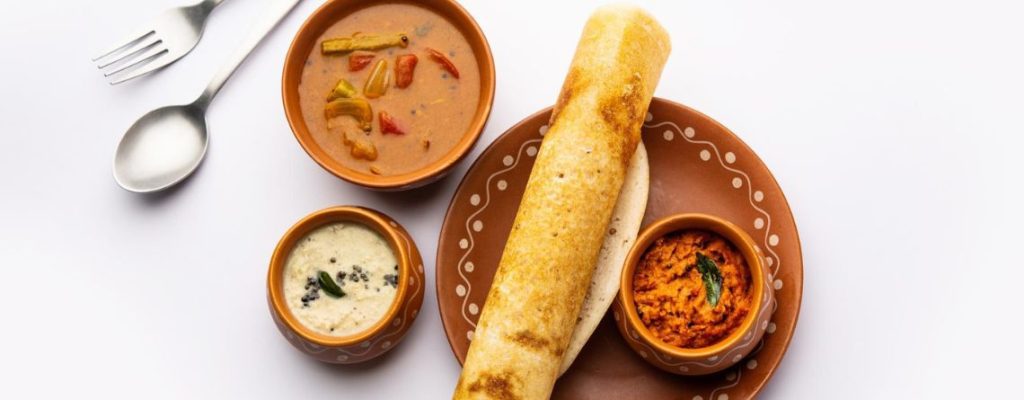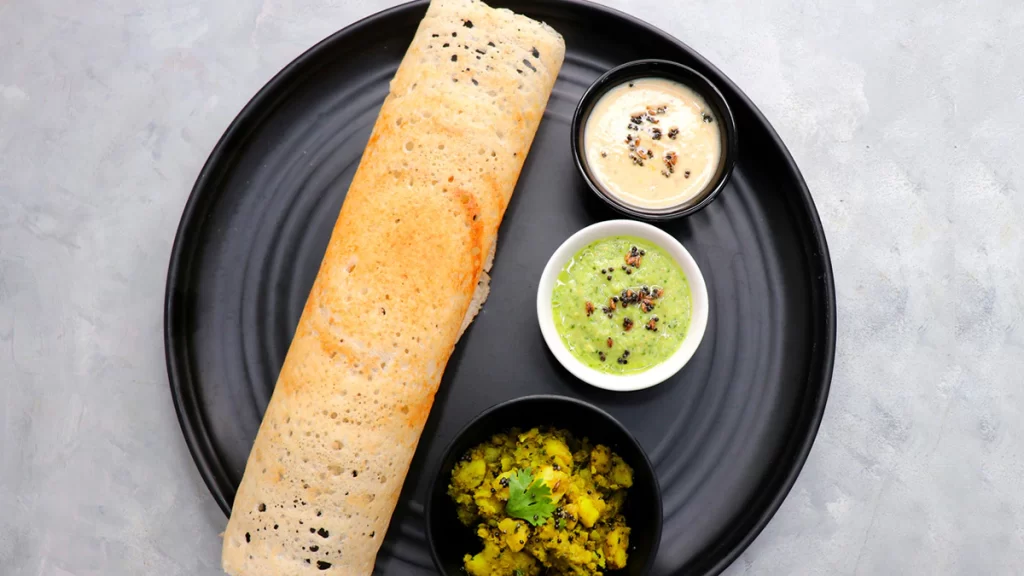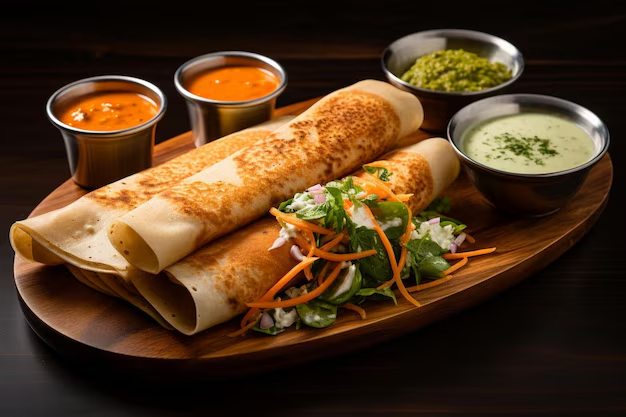Learn about Can i Eat Masala Dosa During Pregnancy. Learn about the health benefits, nutritional value, and considerations for eating masala dosa during pregnancy, including alternative dosas for a balanced diet.
Introduction
Masala dosa is a popular South Indian dish consisting of rice crepes and potato salad with an Indian masala. The rice and urad dal (black gram) are soaked, ground, and udder fermented, the resulting batter when poured and spread in a thin film on a hot griddle forms a large crepe that is crisp and brown. The spice mix is generally used for this dish at the core and comprises boiled potatoes and how these are prepared with cooling and seasoning including onions, green chilies, mustard, turmeric, and a forum of cumin.
This stuffing gives a warm scent and adds some body feel which is on top of the crunchy dosa. Sambar is a curried lentil-vegetable casserole that is often served with masala dosa, along with coconut or tomato chutneys. Many Indians prefer dosa because it is carbohydrate-enriched with healthy fiber and protein, thus making it a complete meal. While living in India for quite some time, I received lots of information about the particulars of eating masala dosa.

Understanding the Nutritional Profile of Masala Dosa
Rice
Rice in masala dosa is a great source of energy in the form of carbohydrates. A woman must sustain her energy levels during pregnancy and rice can provide that energy levels in constant supply. Moreover, rice does not cause discomfort in the stomach even when ingested in large quantities and therefore, is appropriate for women who are pregnant and may have issues in the digestive system.
Urad Dal (Black Gram)
Urad dal is rich in proteins and a range of necessary amino acids that are crucial, in tissue formation of the baby and for the muscles of the mother. Additionally, this protein source aids in blood sugar management and is thus an energy-sustaining food. Urad dal is a great protein for vegetarians which keeps pregnant women satisfied with nutrients while avoiding excess fats.
Potatoes
The starch present in potatoes consists of complex carbohydrates along with some fiber and vitamins such as vitamin C that are helpful in boosting the immune system and keeping proper digestion. The fiber contained in potatoes also helps prevent another pregnancy problem which is constipation. The same potatoes also augment the energy production process with their B vitamins thus keeping the mothers active and well nourished.
Spices (Cumin, Mustard Seeds, Turmeric)
The spices of a dosai contain many antioxidants and possess anti-inflammatory properties as well. On the other hand, for instance, cumin and mustard seeds promote digestion while turmeric is mainly for boosting immunity. These spices give an extra taste to the delicacy while serving the purpose of health benefits thus making masala dosa a healthy and filling food option for expectant mothers.
Can I Eat Masala Dosa During Pregnancy?
Yes, it is safe to consume masala dosa in pregnancy, but with certain considerations. This is a traditional dish that dominates the south Indian cuisine consisting of rice and lentils which serve nutrients such as carbohydrates for energy, and proteins for body growth, and also contains fibers for facilitating easy excretion of food. The potato filling in addition serves more fiber and vitamin C that helps boost immunity and digestion.
However, the oil and spice level has to be constantly checked. Too much oil would give unwanted calories while too much spices often lead to acidity or heartburn-a very common discomfort pregnant women experience. Homemade masala dosa allows ingredients to be controlled and toned down if there is excess spiciness. Mild chutneys such as coconut or tomato for instance help to enhance the nutrition of the meal and make it ideal for expectant mothers.
Benefits of Eating Masala Dosa During Pregnancy
1. Calories
Masala dosa is rich in carbohydrates which are crucial in supplying energy during pregnancy. However, masala dosa is also very rich in calories in particular with high usage of oil or ghee in the preparation. In addition, controlling portion scale and adjustment in cooking techniques could help in alleviating excess calorie intake thus enabling pregnant women to partake in this delicacy without gaining unwanted weight.
2. Chutneys
Chutneys like coconut and tomato which are served along with masala dosa contain distinct flavors and nutrients. Coconut chutney is rich in healthy oils and fiber facilitating digestion, while tomato contains vitamins with vitamin C content and antioxidants included. However, too many spicy or sour chutneys should be avoided as they tend to aggravate conditions such as heartburn which is common during pregnancy.
3. Other Nutrients
Masala dosa is healthy because it has an ample amount of vitamins and minerals. This is so since the dose is prepared from the dal batter which is a source of protein for the growing child and potato stuffing is used which contains dietary fiber and vitamin B6 which contains potassium. Masala dosa can be incorporated into foodstuffs that will help one add weight. These vitamins & minerals are beneficial to functional digestion, managing blood pressure, and general wellness in a person. Therefore, there is no danger in taking in these nutrients for a pregnant woman.
Some Other Foods During Pregnancy
Here are some other foods that can be part of a healthy pregnancy diet:
Whole Grains, Legumes, and Brown Rice
Other sources of high fiber, iron, and complex carbohydrates include oats, brown rice, whole-grain cereals, and beans. The nutrients play an important role in regulating blood sugars, helping to maintain normal bowel movements, as well as providing adequate energy supply for the mother and child during the lactation period. Lentils, chickpeas, and other legumes are also wonderful sources of protein for women in the pregnant stage.

Paneer, Soy Chunks, Curds, Chicken, Fish, and Eggs
These protein suppliers are important for the growth of muscle and tissue, both for the mother and also for the baby. Food products such as paneer are high in calcium which is important for the formation and growth of bones in the developing fetus. Sources of proteins like chicken, seafood, and eggs contain amino acids in plenty; in addition, eggs, and especially fish are also high in omega-3 fatty acids which are essential fats needed in the baby’s brain growth.
Nuts, Seeds, Olive Oil, and Avocado
The refined oils from nuts, seeds, and avocado provide the omega 3 and omega 6 fatty acids which are essential for the development of the fetus and its nervous system. Antioxidant-rich olive oil helps to increase the levels of healthy omega fats in such foods as the above and helps to support energy and skin health whilst also maintaining an appropriate level of nutrition throughout pregnancy.
Pregnant women can eat a variety of dosas
Pregnant women can eat various kinds of dosas
1. Pesarattu Moong Dal Dosa
Pesarattu dosa is a healthy dosa made using green gram or moong dal which is packed with proteins, fiber, and other essential components. It aids in digestion, muscle growth, and energy recovery after or during pregnancy since it is of lightweight, easily digestible properties, and can be served with different chutneys to make a perfect meal.
2. Adai Dosa
Adai dosa is another healthy variant made with a combination of several lentils and rice. Adai dosa will be good for both mother and baby because it’s rich in protein, iron, and fiber. The amino acids are present in the lentils for fetal growth, and the fiber content is high, so one will not face constipation, which sustains their pregnancy.
3. Paneer Dosa
In the case of paneer dosa, paneer is included within the dosa and an entirely new taste is formed and calcium proteins and healthy fats are also enriched. These nutrients not only help in the formation of the fetal skeletal system but also the fortification of the muscles in the mother. More so, paneer dosa is so tasteful and healthy at the same time that energy for pregnant ladies lasts for a long time after taking it.
4. Davangere Benne Dosa
This dish from Karnataka features the addition of butter (benne), which makes the crispy dosa richer. Delicious as it is, the butter content of the dish also contains good fats essential for the proper brain development of the fetus. There is no harm in enjoying Davangere benne dosa chances are pregnant women will have to enjoy it with less butter for taste and health factors.

FAQs
Can I eat masala dosa if I have gestational diabetes?
Gestational diabetes means that you should be careful while eating masala dosa and should limit the carbohydrates. Prefer whole kernels and add vegetables to increase the roughage which aids in controlling blood sugar levels.
Is masala dosa a good breakfast option during pregnancy?
For sure, masala dosa is also a very good breakfast since it contains adequate amounts of carbohydrates, protein, and fibers which are sufficient to provide the energy requisite of the body, particularly in the morning hours.
Are fermented foods like dosa batter safe during pregnancy?
Generally, fermenting by moderating is safe, however, do not overdo the process in order to limit the acid content. Ensure that the batter is not misused so that the chances of bacteriological invasiveness are lessened.
Conclusion
Masala dosa can be a delicious and healthy option in pregnancy provided it is made fresh, not overly spicy, and contains lesser amounts of oil than usual. By making the dish at home and adding more vegetables, this Indian dish can be consumed guilt-free without compromising on nutrition and a healthy pregnancy. It is not only safe to eat masala dosa when pregnant, but as well it has plenty of nutritional value. It is tasty and healthy, provided you do not overconsume it; better still, you can make a few changes so that it fits your needs during this period.
